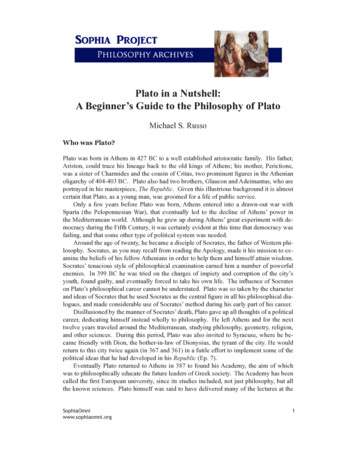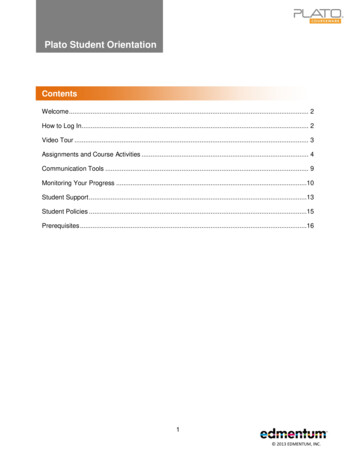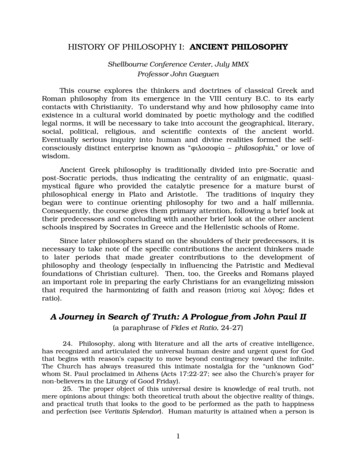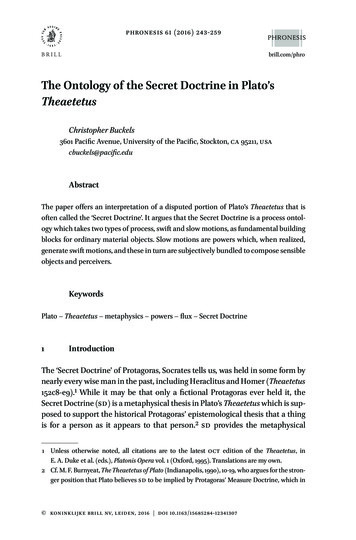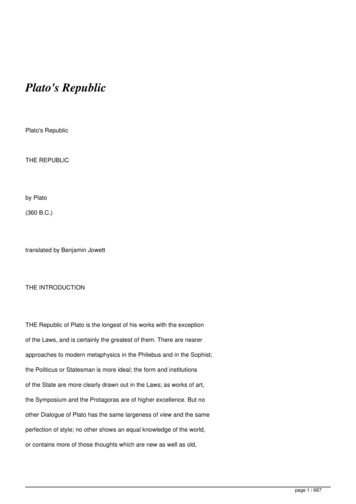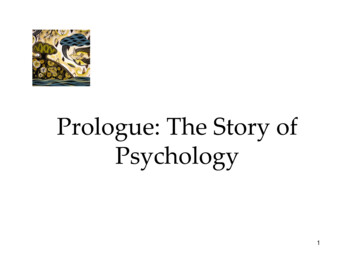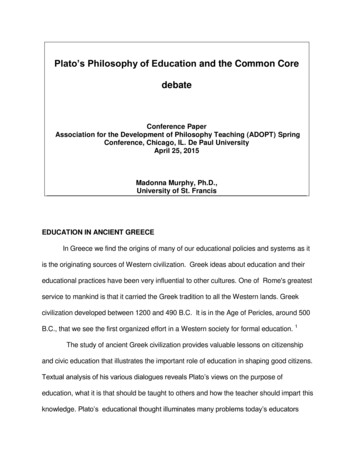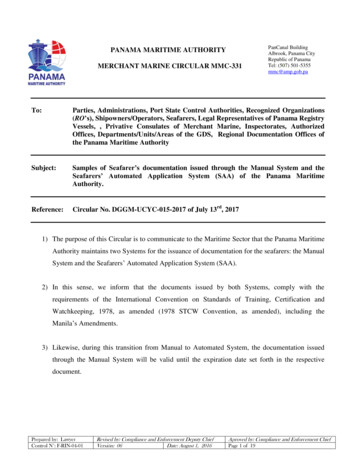
Transcription
The RepublicByPlato1
THE REPUBLIC.PERSONS OF THE DIALOGUE.Socrates, who is the hrasymachus.Cleitophon.And others who are mute auditors.The scene is laid in the house of Cephalus at the Piraeus; and the wholedialogue is narrated by Socrates the day after it actually took place toTimaeus, Hermocrates, Critias, and a nameless person, who are introduced2
in the Timaeus.BOOK I.I went down yesterday to the Piraeus with Glaucon the son of Ariston,that I might offer up my prayers to the goddess (Bendis, the ThracianArtemis.); and also because I wanted to see in what manner they wouldcelebrate the festival, which was a new thing. I was delighted with theprocession of the inhabitants; but that of the Thracians was equally,if not more, beautiful. When we had finished our prayers and viewed thespectacle, we turned in the direction of the city; and at that instantPolemarchus the son of Cephalus chanced to catch sight of us from adistance as we were starting on our way home, and told his servant torun and bid us wait for him. The servant took hold of me by the cloakbehind, and said: Polemarchus desires you to wait.I turned round, and asked him where his master was.There he is, said the youth, coming after you, if you will only wait.Certainly we will, said Glaucon; and in a few minutes Polemarchusappeared, and with him Adeimantus, Glaucon's brother, Niceratus the sonof Nicias, and several others who had been at the procession.3
Polemarchus said to me: I perceive, Socrates, that you and yourcompanion are already on your way to the city.You are not far wrong, I said.But do you see, he rejoined, how many we are?Of course.And are you stronger than all these? for if not, you will have to remainwhere you are.May there not be the alternative, I said, that we may persuade you tolet us go?But can you persuade us, if we refuse to listen to you? he said.Certainly not, replied Glaucon.Then we are not going to listen; of that you may be assured.Adeimantus added: Has no one told you of the torch-race on horseback inhonour of the goddess which will take place in the evening?With horses! I replied: That is a novelty. Will horsemen carry torches4
and pass them one to another during the race?Yes, said Polemarchus, and not only so, but a festival will becelebrated at night, which you certainly ought to see. Let us rise soonafter supper and see this festival; there will be a gathering of youngmen, and we will have a good talk. Stay then, and do not be perverse.Glaucon said: I suppose, since you insist, that we must.Very good, I replied.Accordingly we went with Polemarchus to his house; and there we foundhis brothers Lysias and Euthydemus, and with them Thrasymachus theChalcedonian, Charmantides the Paeanian, and Cleitophon the son ofAristonymus. There too was Cephalus the father of Polemarchus, whom Ihad not seen for a long time, and I thought him very much aged. He wasseated on a cushioned chair, and had a garland on his head, for he hadbeen sacrificing in the court; and there were some other chairs in theroom arranged in a semicircle, upon which we sat down by him. He salutedme eagerly, and then he said:--You don't come to see me, Socrates, as often as you ought: If I werestill able to go and see you I would not ask you to come to me. Butat my age I can hardly get to the city, and therefore you should comeoftener to the Piraeus. For let me tell you, that the more the pleasuresof the body fade away, the greater to me is the pleasure and charm5
of conversation. Do not then deny my request, but make our house yourresort and keep company with these young men; we are old friends, andyou will be quite at home with us.I replied: There is nothing which for my part I like better, Cephalus,than conversing with aged men; for I regard them as travellers whohave gone a journey which I too may have to go, and of whom I ought toenquire, whether the way is smooth and easy, or rugged and difficult.And this is a question which I should like to ask of you who havearrived at that time which the poets call the 'threshold of old age'--Islife harder towards the end, or what report do you give of it?I will tell you, Socrates, he said, what my own feeling is. Men of myage flock together; we are birds of a feather, as the old proverb says;and at our meetings the tale of my acquaintance commonly is--I cannoteat, I cannot drink; the pleasures of youth and love are fled away:there was a good time once, but now that is gone, and life is no longerlife. Some complain of the slights which are put upon them by relations,and they will tell you sadly of how many evils their old age is thecause. But to me, Socrates, these complainers seem to blame that whichis not really in fault. For if old age were the cause, I too being old,and every other old man, would have felt as they do. But this is notmy own experience, nor that of others whom I have known. How well Iremember the aged poet Sophocles, when in answer to the question, Howdoes love suit with age, Sophocles,--are you still the man you were?Peace, he replied; most gladly have I escaped the thing of which you6
speak; I feel as if I had escaped from a mad and furious master. Hiswords have often occurred to my mind since, and they seem as good tome now as at the time when he uttered them. For certainly old age hasa great sense of calm and freedom; when the passions relax their hold,then, as Sophocles says, we are freed from the grasp not of one madmaster only, but of many. The truth is, Socrates, that these regrets,and also the complaints about relations, are to be attributed to thesame cause, which is not old age, but men's characters and tempers; forhe who is of a calm and happy nature will hardly feel the pressure ofage, but to him who is of an opposite disposition youth and age areequally a burden.I listened in admiration, and wanting to draw him out, that he might goon--Yes, Cephalus, I said: but I rather suspect that people in generalare not convinced by you when you speak thus; they think that oldage sits lightly upon you, not because of your happy disposition, butbecause you are rich, and wealth is well known to be a great comforter.You are right, he replied; they are not convinced: and there issomething in what they say; not, however, so much as they imagine. Imight answer them as Themistocles answered the Seriphian who was abusinghim and saying that he was famous, not for his own merits but because hewas an Athenian: 'If you had been a native of my country or I of yours,neither of us would have been famous.' And to those who are not rich andare impatient of old age, the same reply may be made; for to the goodpoor man old age cannot be a light burden, nor can a bad rich man ever7
have peace with himself.May I ask, Cephalus, whether your fortune was for the most partinherited or acquired by you?Acquired! Socrates; do you want to know how much I acquired? In the artof making money I have been midway between my father and grandfather:for my grandfather, whose name I bear, doubled and trebled the value ofhis patrimony, that which he inherited being much what I possess now;but my father Lysanias reduced the property below what it is at present:and I shall be satisfied if I leave to these my sons not less but alittle more than I received.That was why I asked you the question, I replied, because I see that youare indifferent about money, which is a characteristic rather of thosewho have inherited their fortunes than of those who have acquired them;the makers of fortunes have a second love of money as a creation oftheir own, resembling the affection of authors for their own poems, orof parents for their children, besides that natural love of it for thesake of use and profit which is common to them and all men. And hencethey are very bad company, for they can talk about nothing but thepraises of wealth.That is true, he said.Yes, that is very true, but may I ask another question?--What do you8
consider to be the greatest blessing which you have reaped from yourwealth?One, he said, of which I could not expect easily to convince others.For let me tell you, Socrates, that when a man thinks himself to be neardeath, fears and cares enter into his mind which he never had before;the tales of a world below and the punishment which is exacted thereof deeds done here were once a laughing matter to him, but now heis tormented with the thought that they may be true: either from theweakness of age, or because he is now drawing nearer to that otherplace, he has a clearer view of these things; suspicions and alarmscrowd thickly upon him, and he begins to reflect and consider whatwrongs he has done to others. And when he finds that the sum of histransgressions is great he will many a time like a child start up in hissleep for fear, and he is filled with dark forebodings. But to him whois conscious of no sin, sweet hope, as Pindar charmingly says, is thekind nurse of his age:'Hope,' he says, 'cherishes the soul of him who lives in justiceand holiness, and is the nurse of his age and the companion of hisjourney;--hope which is mightiest to sway the restless soul of man.'How admirable are his words! And the great blessing of riches, I do notsay to every man, but to a good man, is, that he has had no occasion todeceive or to defraud others, either intentionally or unintentionally;and when he departs to the world below he is not in any apprehension9
about offerings due to the gods or debts which he owes to men. Now tothis peace of mind the possession of wealth greatly contributes; andtherefore I say, that, setting one thing against another, of the manyadvantages which wealth has to give, to a man of sense this is in myopinion the greatest.Well said, Cephalus, I replied; but as concerning justice, what isit?--to speak the truth and to pay your debts--no more than this? Andeven to this are there not exceptions? Suppose that a friend when in hisright mind has deposited arms with me and he asks for them when he isnot in his right mind, ought I to give them back to him? No one wouldsay that I ought or that I should be right in doing so, any more thanthey would say that I ought always to speak the truth to one who is inhis condition.You are quite right, he replied.But then, I said, speaking the truth and paying your debts is not acorrect definition of justice.Quite correct, Socrates, if Simonides is to be believed, saidPolemarchus interposing.I fear, said Cephalus, that I must go now, for I have to look after thesacrifices, and I hand over the argument to Polemarchus and the company.10
Is not Polemarchus your heir? I said.To be sure, he answered, and went away laughing to the sacrifices.Tell me then, O thou heir of the argument, what did Simonides say, andaccording to you truly say, about justice?He said that the repayment of a debt is just, and in saying so heappears to me to be right.I should be sorry to doubt the word of such a wise and inspired man, buthis meaning, though probably clear to you, is the reverse of clear tome. For he certainly does not mean, as we were just now saying, that Iought to return a deposit of arms or of anything else to one who asksfor it when he is not in his right senses; and yet a deposit cannot bedenied to be a debt.True.Then when the person who asks me is not in his right mind I am by nomeans to make the return?Certainly not.When Simonides said that the repayment of a debt was justice, he did notmean to include that case?11
Certainly not; for he thinks that a friend ought always to do good to afriend and never evil.You mean that the return of a deposit of gold which is to the injury ofthe receiver, if the two parties are friends, is not the repayment of adebt,--that is what you would imagine him to say?Yes.And are enemies also to receive what we owe to them?To be sure, he said, they are to receive what we owe them, and an enemy,as I take it, owes to an enemy that which is due or proper to him--thatis to say, evil.Simonides, then, after the manner of poets, would seem to have spokendarkly of the nature of justice; for he really meant to say that justiceis the giving to each man what is proper to him, and this he termed adebt.That must have been his meaning, he said.By heaven! I replied; and if we asked him what due or proper thing isgiven by medicine, and to whom, what answer do you think that he wouldmake to us?12
He would surely reply that medicine gives drugs and meat and drink tohuman bodies.And what due or proper thing is given by cookery, and to what?Seasoning to food.And what is that which justice gives, and to whom?If, Socrates, we are to be guided at all by the analogy of the precedinginstances, then justice is the art which gives good to friends and evilto enemies.That is his meaning then?I think so.And who is best able to do good to his friends and evil to his enemiesin time of sickness?The physician.Or when they are on a voyage, amid the perils of the sea?The pilot.13
And in what sort of actions or with a view to what result is the justman most able to do harm to his enemy and good to his friend?In going to war against the one and in making alliances with the other.But when a man is well, my dear Polemarchus, there is no need of aphysician?No.And he who is not on a voyage has no need of a pilot?No.Then in time of peace justice will be of no use?I am very far from thinking so.You think that justice may be of use in peace as well as in war?Yes.Like husbandry for the acquisition of corn?Yes.14
Or like shoemaking for the acquisition of shoes,--that is what you mean?Yes.And what similar use or power of acquisition has justice in time ofpeace?In contracts, Socrates, justice is of use.And by contracts you mean partnerships?Exactly.But is the just man or the skilful player a more useful and betterpartner at a game of draughts?The skilful player.And in the laying of bricks and stones is the just man a more useful orbetter partner than the builder?Quite the reverse.Then in what sort of partnership is the just man a better partner thanthe harp-player, as in playing the harp the harp-player is certainly a15
better partner than the just man?In a money partnership.Yes, Polemarchus, but surely not in the use of money; for you do notwant a just man to be your counsellor in the purchase or sale of ahorse; a man who is knowing about horses would be better for that, wouldhe not?Certainly.And when you want to buy a ship, the shipwright or the pilot would bebetter?True.Then what is that joint use of silver or gold in which the just man isto be preferred?When you want a deposit to be kept safely.You mean when money is not wanted, but allowed to lie?Precisely.That is to say, justice is useful when money is useless?16
That is the inference.And when you want to keep a pruning-hook safe, then justice is useful tothe individual and to the state; but when you want to use it, then theart of the vine-dresser?Clearly.And when you want to keep a shield or a lyre, and not to use them, youwould say that justice is useful; but when you want to use them, thenthe art of the soldier or of the musician?Certainly.And so of all other things;--justice is useful when they are useless,and useless when they are useful?That is the inference.Then justice is not good for much. But let us consider this furtherpoint: Is not he who can best strike a blow in a boxing match or in anykind of fighting best able to ward off a blow?Certainly.17
And he who is most skilful in preventing or escaping from a disease isbest able to create one?True.And he is the best guard of a camp who is best able to steal a marchupon the enemy?Certainly.Then he who is a good keeper of anything is also a good thief?That, I suppose, is to be inferred.Then if the just man is good at keeping money, he is good at stealingit.That is implied in the argument.Then after all the just man has turned out to be a thief. And this isa lesson which I suspect you must have learnt out of Homer; for he,speaking of Autolycus, the maternal grandfather of Odysseus, who is afavourite of his, affirms that'He was excellent above all men in theft and perjury.'18
And so, you and Homer and Simonides are agreed that justice is an art oftheft; to be practised however 'for the good of friends and for the harmof enemies,'--that was what you were saying?No, certainly not that, though I do not now know what I did say; but Istill stand by the latter words.Well, there is another question: By friends and enemies do we mean thosewho are so really, or only in seeming?Surely, he said, a man may be expected to love those whom he thinksgood, and to hate those whom he thinks evil.Yes, but do not persons often err about good and evil: many who are notgood seem to be so, and conversely?That is true.Then to them the good will be enemies and the evil will be theirfriends? True.And in that case they will be right in doing good to the evil and evilto the good?Clearly.19
But the good are just and would not do an injustice?True.Then according to your argument it is just to injure those who do nowrong?Nay, Socrates; the doctrine is immoral.Then I suppose that we ought to do good to the just and harm to theunjust?I like that better.But see the consequence:--Many a man who is ignorant of human naturehas friends who are bad friends, and in that case he ought to do harm tothem; and he has good enemies whom he ought to benefit; but, if so, weshall be saying the very opposite of that which we affirmed to be themeaning of Simonides.Very true, he said: and I think that we had better correct an errorinto which we seem to have fallen in the use of the words 'friend' and'enemy.'What was the error, Polemarchus? I asked.20
We assumed that he is a friend who seems to be or who is thought good.And how is the error to be corrected?We should rather say that he is a friend who is, as well as seems, good;and that he who seems only, and is not good, only seems to be and is nota friend; and of an enemy the same may be said.You would argue that the good are our friends and the bad our enemies?Yes.And instead of saying simply as we did at first, that it is just to dogood to our friends and harm to our enemies, we should further say: Itis just to do good to our friends when they are good and harm to ourenemies when they are evil?Yes, that appears to me to be the truth.But ought the just to injure any one at all?Undoubtedly he ought to injure those who are both wicked and hisenemies.When horses are injured, are they improved or deteriorated?21
The latter.Deteriorated, that is to say, in the good qualities of horses, not ofdogs?Yes, of horses.And dogs are deteriorated in the good qualities of dogs, and not ofhorses?Of course.And will not men who are injured be deteriorated in that which is theproper virtue of man?Certainly.And that human virtue is justice?To be sure.Then men who are injured are of necessity made unjust?That is the result.But can the musician by his art make men unmusical?22
Certainly not.Or the horseman by his art make them bad horsemen?Impossible.And can the just by justice make men unjust, or speaking generally, canthe good by virtue make them bad?Assuredly not.Any more than heat can produce cold?It cannot.Or drought moisture?Clearly not.Nor can the good harm any one?Impossible.And the just is the good?23
Certainly.Then to injure a friend or any one else is not the act of a just man,but of the opposite, who is the unjust?I think that what you say is quite true, Socrates.Then if a man says that justice consists in the repayment of debts, andthat good is the debt which a just man owes to his friends, and evil thedebt which he owes to his enemies,--to say this is not wise; for it isnot true, if, as has been clearly shown, the injuring of another can bein no case just.I agree with you, said Polemarchus.Then you and I are prepared to take up arms against any one whoattributes such a saying to Simonides or Bias or Pittacus, or any otherwise man or seer?I am quite ready to do battle at your side, he said.Shall I tell you whose I believe the saying to be?Whose?I believe that Periander or Perdiccas or Xerxes or Ismenias the Theban,24
or some other rich and mighty man, who had a great opinion of his ownpower, was the first to say that justice is 'doing good to your friendsand harm to your enemies.'Most true, he said.Yes, I said; but if this definition of justice also breaks down, whatother can be offered?Several times in the course of the discussion Thrasymachus had made anattempt to get the argument into his own hands, and had been put downby the rest of the company, who wanted to hear the end. But whenPolemarchus and I had done speaking and there was a pause, he could nolonger hold his peace; and, gathering himself up, he came at us like awild beast, seeking to devour us. We were quite panic-stricken at thesight of him.He roared out to the whole company: What folly, Socrates, has takenpossession of you all? And why, sillybillies, do you knock under toone another? I say that if you want really to know what justice is,you should not only ask but answer, and you should not seek honour toyourself from the refutation of an opponent, but have your own answer;for there is many a one who can ask and cannot answer. And now I willnot have you say that justice is duty or advantage or profit or gainor interest, for this sort of nonsense will not do for me; I must haveclearness and accuracy.25
I was panic-stricken at his words, and could not look at him withouttrembling. Indeed I believe that if I had not fixed my eye upon him, Ishould have been struck dumb: but when I saw his fury rising, I lookedat him first, and was therefore able to reply to him.Thrasymachus, I said, with a quiver, don't be hard upon us. Polemarchusand I may have been guilty of a little mistake in the argument, but Ican assure you that the error was not intentional. If we were seekingfor a piece of gold, you would not imagine that we were 'knocking underto one another,' and so losing our chance of finding it. And why, whenwe are seeking for justice, a thing more precious than many pieces ofgold, do you say that we are weakly yielding to one another and notdoing our utmost to get at the truth? Nay, my good friend, we are mostwilling and anxious to do so, but the fact is that we cannot. And if so,you people who know all things should pity us and not be angry with us.How characteristic of Socrates! he replied, with a bitter laugh;--that'syour ironical style! Did I not foresee--have I not already told you,that whatever he was asked he would refuse to answer, and try irony orany other shuffle, in order that he might avoid answering?You are a philosopher, Thrasymachus, I replied, and well know that ifyou ask a person what numbers make up twelve, taking care to prohibithim whom you ask from answering twice six, or three times four, or sixtimes two, or four times three, 'for this sort of nonsense will not do26
for me,'--then obviously, if that is your way of putting thequestion, no one can answer you. But suppose that he were to retort,'Thrasymachus, what do you mean? If one of these numbers which youinterdict be the true answer to the question, am I falsely to say someother number which is not the right one?--is that your meaning?'--Howwould you answer him?Just as if the two cases were at all alike! he said.Why should they not be? I replied; and even if they are not, but onlyappear to be so to the person who is asked, ought he not to say what hethinks, whether you and I forbid him or not?I presume then that you are going to make one of the interdictedanswers?I dare say that I may, notwithstanding the danger, if upon reflection Iapprove of any of them.But what if I give you an answer about justice other and better, hesaid, than any of these? What do you deserve to have done to you?Done to me!--as becomes the ignorant, I must learn from the wise--thatis what I deserve to have done to me.What, and no payment! a pleasant notion!27
I will pay when I have the money, I replied.But you have, Socrates, said Glaucon: and you, Thrasymachus, need beunder no anxiety about money, for we will all make a contribution forSocrates.Yes, he replied, and then Socrates will do as he always does--refuse toanswer himself, but take and pull to pieces the answer of some one else.Why, my good friend, I said, how can any one answer who knows, and saysthat he knows, just nothing; and who, even if he has some faint notionsof his own, is told by a man of authority not to utter them? Thenatural thing is, that the speaker should be some one like yourselfwho professes to know and can tell what he knows. Will you then kindlyanswer, for the edification of the company and of myself?Glaucon and the rest of the company joined in my request, andThrasymachus, as any one might see, was in reality eager to speak;for he thought that he had an excellent answer, and would distinguishhimself. But at first he affected to insist on my answering; at lengthhe consented to begin. Behold, he said, the wisdom of Socrates; herefuses to teach himself, and goes about learning of others, to whom henever even says Thank you.That I learn of others, I replied, is quite true; but that I am28
ungrateful I wholly deny. Money I have none, and therefore I pay inpraise, which is all I have; and how ready I am to praise any one whoappears to me to speak well you will very soon find out when you answer;for I expect that you will answer well.Listen, then, he said; I proclaim that justice is nothing else thanthe interest of the stronger. And now why do you not praise me? But ofcourse you won't.Let me first understand you, I replied. Justice, as you say, is theinterest of the stronger. What, Thrasymachus, is the meaning of this?You cannot mean to say that because Polydamas, the pancratiast, isstronger than we are, and finds the eating of beef conducive to hisbodily strength, that to eat beef is therefore equally for our good whoare weaker than he is, and right and just for us?That's abominable of you, Socrates; you take the words in the sensewhich is most damaging to the argument.Not at all, my good sir, I said; I am trying to understand them; and Iwish that you would be a little clearer.Well, he said, have you never heard that forms of government differ;there are tyrannies, and there are democracies, and there arearistocracies?29
Yes, I know.And the government is the ruling power in each state?Certainly.And the different forms of government make laws democratical,aristocratical, tyrannical, with a view to their several interests;and these laws, which are made by them for their own interests, are thejustice which they deliver to their subjects, and him who transgressesthem they punish as a breaker of the law, and unjust. And that is whatI mean when I say that in all states there is the same principle ofjustice, which is the interest of the government; and as the governmentmust be supposed to have power, the only reasonable conclusion is, thateverywhere there is one principle of justice, which is the interest ofthe stronger.Now I understand you, I said; and whether you are right or not I willtry to discover. But let me remark, that in defining justice you haveyourself used the word 'interest' which you forbade me to use. It istrue, however, that in your definition the words 'of the stronger' areadded.A small addition, you must allow, he said.Great or small, never mind about that: we must first enquire whether30
what you are saying is the truth. Now we are both agreed that justiceis interest of some sort, but you go on to say 'of the stronger'; aboutthis addition I am not so sure, and must therefore consider further.Proceed.I will; and first tell me, Do you admit that it is just for subjects toobey their rulers?I do.But are the rulers of states absolutely infallible, or are theysometimes liable to err?To be sure, he replied, they are liable to err.Then in making their laws they may sometimes make them rightly, andsometimes not?True.When they make them rightly, they make them agreeably to their interest;when they are mistaken, contrary to their interest; you admit that?Yes.31
And the laws which they make must be obeyed by their subjects,--and thatis what you call justice?Doubtless.Then justice, according to your argument, is not only obedience to theinterest of the stronger but the reverse?What is that you are saying? he asked.I am only repeating what you are saying, I believe. But let us consider:Have we not admitted that the rulers may be mistaken about their owninterest in what they command, and also that to obey them is justice?Has not that been admitted?Yes.Then you must also have acknowledged justice not to be for the interestof the stronger, when the rulers unintentionally command things to bedone which are to their own injury. For if, as you say, justice is theobedience which the subject renders to their commands, in that case, Owisest of men, is there any escape from the conclusion that the weakerare commanded to do, not what is for the interest, but what is for theinjury of the stronger?Nothing can be clearer, Socrates, said Polemarchus.32
Yes, said Cleitophon, interposing, if you are allowed to be his witness.But there is no need of any witness, said Polemarchus, for Thrasymachushimself acknowledges that rulers may sometimes command what is not fortheir own interest, and that for subjects to obey them is justice.Yes, Polemarchus,--Thrasymachus said that for subjects to do what wascommanded by their rulers is just.Yes, Cleitophon, but he also said that justice is the interest of thestronger, and, while admitting both these propositions, he furtheracknowledged that the stronger may command the weaker who are hissubjects to do what is not for his own interest; whence follows thatjustice is the injury quite as much as the interest of the stronger.But, said Cleitophon, he
run and bid us wait for him. The servant took hold of me by the cloak behind, and said: Polemarchus desires you to wait. I turned round, and asked him where his master was. There he is, said the youth, coming after you, if you will only wait. Certainl
